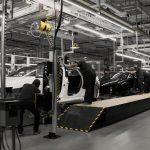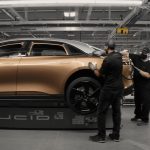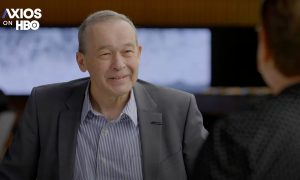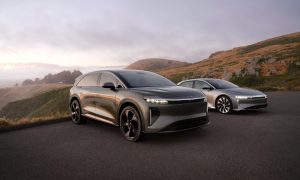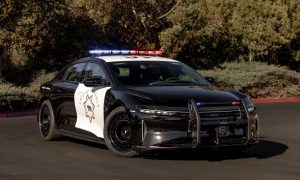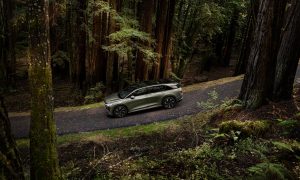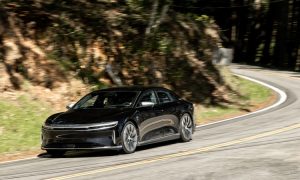Lucid Motors has officially announced the completion of its first phase of construction at its Advanced Manufacturing Plant (AMP-1) facility in Casa Grande, Arizona, and plans to begin the first production phase in Spring 2021. As the commissioning of production equipment and processes underway, Lucid looks to begin manufacturing its Dream Edition of the Air within the coming months, bringing another all-electric automaker to the highly competitive American car market.
The AMP-1 facility was designed with a future-ready focus that allows for additional phases of expansion at the site, which could come in handy if Lucid manages to sell a lot of vehicles. Lucid also stated that this is not the only phase of construction, and this marks the completion of the first phase only. The next phase is set to begin in early 2021 and will make way for the production of Lucid’s introductory SUV in 2023, which has been given the name Project Gravity.
Credit: Lucid Motors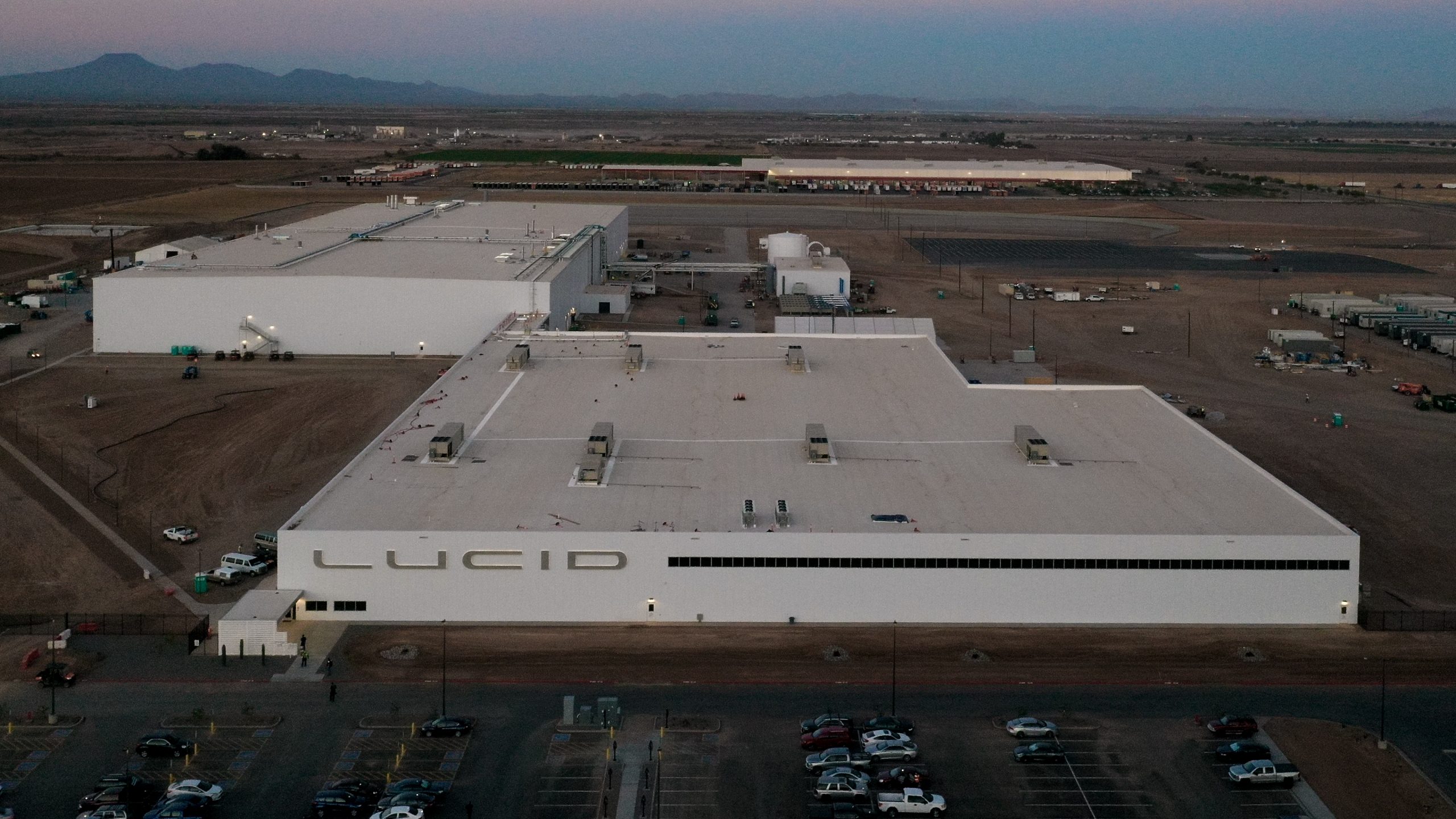
Lucid CEO and CTO Peter Rawlinson detailed his company’s development of the massive land slot in Arizona in a press release from the automaker.
“We broke ground on the 590-acre Lucid AMP-1 site in Casa Grande, Arizona, on December 2, 2019, and slightly less than a year later we have completed the first purpose-built EV factory in North America. The effort and agility demonstrated by this team is truly astounding, as we’re already commissioning equipment compatible with the Lucid manufacturing system to start production of the next-generation EV, Lucid Air, in just a few months,” Rawlinson stated.
To ensure the production is accurate and effective and officially bring the plant into commission, Lucid has already built a full beta prototype test fleet, which comprises several Air models. Lucid’s manufacturing system utilizes advanced processes, including an aircraft-inspired riveted and bonded monocoque body structure, which replaces spot welds, a commonly used tactic in automotive manufacturing. The strategy behind using rivets and monocoque body structures was to increase the Air’s structural efficiency, a main focus of its introductory sedan.
When the production lines begin operation next Spring, Lucid says it will be capable of building 30,000 units annually, which will supply global markets beginning in North America. The Dream Edition will be first, with the Grand Touring and Touring models following shortly thereafter. The company’s base model, which was recently labeled the Lucid Air Pure, will begin production in early 2022.
Lucid chose Arizona for its first production plant for several reasons. Not only were infrastructure, talent, location, and pre-existing automotive supply chain significant advantages, but the land was suitable for a large facility that would invite expansions as the company intends to grow over the coming years. The company purposely chose this site, intending to build onto the plant within the next few years, and it’s state-of-the-art, water-based paint shop can be included as it meets the needs of all future phases of the factory, Lucid said. Four phases of construction are planned through 2029, taking the current square footage of 999,000 to 5.1 million by when it is completed.
- Lucid’s Water-Based paint facility. (Credit: Lucid Motors)
- Lucid’s Water-Based paint facility. (Credit: Lucid Motors)
In 2028, Lucid will be able to build 400,000 vehicles per year at the facility.
“In building this factory, we adhered to several important manufacturing philosophies, including the tenets of ‘Future Ready’ and ‘On Time,’ together which have allowed us to effectively manage our investment and build a brand new factory from the ground up,” Vice President of Manufacturing Peter Hochholding said. “As we add new platforms and vehicles to our lineup, the planning that went into this facility ensures that we will always be able to keep up with growing customer demand for advanced electric vehicles.”
News
Tesla cleared in Canada EV rebate investigation
Tesla has been cleared in an investigation into the company’s staggering number of EV rebate claims in Canada in January.

Canadian officials have cleared Tesla following an investigation into a large number of claims submitted to the country’s electric vehicle (EV) rebates earlier this year.
Transport Canada has ruled that there was no evidence of fraud after Tesla submitted 8,653 EV rebate claims for the country’s Incentives for Zero-Emission Vehicles (iZEV) program, as detailed in a report on Friday from The Globe and Mail. Despite the huge number of claims, Canadian authorities have found that the figure represented vehicles that had been delivered prior to the submission deadline for the program.
According to Transport Minister Chrystia Freeland, the claims “were determined to legitimately represent cars sold before January 12,” which was the final day for OEMs to submit these claims before the government suspended the program.
Upon initial reporting of the Tesla claims submitted in January, it was estimated that they were valued at around $43 million. In March, Freeland and Transport Canada opened the investigation into Tesla, noting that they would be freezing the rebate payments until the claims were found to be valid.
READ MORE ON ELECTRIC VEHICLES: EVs getting cleaner more quickly than expected in Europe: study
Huw Williams, Canadian Automobile Dealers Association Public Affairs Director, accepted the results of the investigation, while also questioning how Tesla knew to submit the claims that weekend, just before the program ran out.
“I think there’s a larger question as to how Tesla knew to run those through on that weekend,” Williams said. “It doesn’t appear to me that we have an investigation into any communication between Transport Canada and Tesla, between officials who may have shared information inappropriately.”
Tesla sales have been down in Canada for the first half of this year, amidst turmoil between the country and the Trump administration’s tariffs. Although Elon Musk has since stepped back from his role with the administration, a number of companies and officials in Canada were calling for a boycott of Tesla’s vehicles earlier this year, due in part to his association with Trump.
News
Tesla Semis to get 18 new Megachargers at this PepsiCo plant
PepsiCo is set to add more Tesla Semi Megachargers, this time at a facility in North Carolina.

Tesla partner PepsiCo is set to build new Semi charging stations at one of its manufacturing sites, as revealed in new permitting plans shared this week.
On Friday, Tesla charging station scout MarcoRP shared plans on X for 18 Semi Megacharging stalls at PepsiCo’s facility in Charlotte, North Carolina, coming as the latest update plans for the company’s increasingly electrified fleet. The stalls are set to be built side by side, along with three Tesla Megapack grid-scale battery systems.
The plans also note the faster charging speeds for the chargers, which can charge the Class 8 Semi at speeds of up to 1MW. Tesla says that the speed can charge the Semi back to roughly 70 percent in around 30 minutes.
You can see the site plans for the PepsiCo North Carolina Megacharger below.

Credit: PepsiCo (via MarcoRPi1 on X)

Credit: PepsiCo (via MarcoRPi1 on X)
READ MORE ON THE TESLA SEMI: Tesla to build Semi Megacharger station in Southern California
PepsiCo’s Tesla Semi fleet, other Megachargers, and initial tests and deliveries
PepsiCo was the first external customer to take delivery of Tesla’s Semis back in 2023, starting with just an initial order of 15. Since then, the company has continued to expand the fleet, recently taking delivery of an additional 50 units in California. The PepsiCo fleet was up to around 86 units as of last year, according to statements from Semi Senior Manager Dan Priestley.
Additionally, the company has similar Megachargers at its facilities in Modesto, Sacramento, and Fresno, California, and Tesla also submitted plans for approval to build 12 new Megacharging stalls in Los Angeles County.
Over the past couple of years, Tesla has also been delivering the electric Class 8 units to a number of other companies for pilot programs, and Priestley shared some results from PepsiCo’s initial Semi tests last year. Notably, the executive spoke with a handful of PepsiCo workers who said they really liked the Semi and wouldn’t plan on going back to diesel trucks.
The company is also nearing completion of a higher-volume Semi plant at its Gigafactory in Nevada, which is expected to eventually have an annual production capacity of 50,000 Semi units.
Tesla executive teases plan to further electrify supply chain
News
Tesla sales soar in Norway with new Model Y leading the charge
Tesla recorded a 54% year-over-year jump in new vehicle registrations in June.

Tesla is seeing strong momentum in Norway, with sales of the new Model Y helping the company maintain dominance in one of the world’s most electric vehicle-friendly markets.
Model Y upgrades and consumer preferences
According to the Norwegian Road Federation (OFV), Tesla recorded a 54% year-over-year jump in new vehicle registrations in June. The Model Y led the charge, posting a 115% increase compared to the same period last year. Tesla Norway’s growth was even more notable in May, with sales surging a whopping 213%, as noted in a CNBC report.
Christina Bu, secretary general of the Norwegian EV Association (NEVA), stated that Tesla’s strong market performance was partly due to the updated Model Y, which is really just a good car, period.
“I think it just has to do with the fact that they deliver a car which has quite a lot of value for money and is what Norwegians need. What Norwegians need, a large luggage space, all wheel drive, and a tow hitch, high ground clearance as well. In addition, quite good digital solutions which people have gotten used to, and also a charging network,” she said.
Tesla in Europe
Tesla’s success in Norway is supported by long-standing government incentives for EV adoption, including exemptions from VAT, road toll discounts, and access to bus lanes. Public and home charging infrastructure is also widely available, making the EV ownership experience in the country very convenient.
Tesla’s performance in Europe is still a mixed bag, with markets like Germany and France still seeing declines in recent months. In areas such as Norway, Spain, and Portugal, however, Tesla’s new car registrations are rising. Spain’s sales rose 61% and Portugal’s sales rose 7% last month. This suggests that regional demand may be stabilizing or rebounding in pockets of Europe.
-

 Elon Musk2 weeks ago
Elon Musk2 weeks agoTesla investors will be shocked by Jim Cramer’s latest assessment
-

 Elon Musk2 days ago
Elon Musk2 days agoxAI launches Grok 4 with new $300/month SuperGrok Heavy subscription
-

 Elon Musk4 days ago
Elon Musk4 days agoElon Musk confirms Grok 4 launch on July 9 with livestream event
-

 News1 week ago
News1 week agoTesla Model 3 ranks as the safest new car in Europe for 2025, per Euro NCAP tests
-

 Elon Musk2 weeks ago
Elon Musk2 weeks agoA Tesla just delivered itself to a customer autonomously, Elon Musk confirms
-

 Elon Musk1 week ago
Elon Musk1 week agoxAI’s Memphis data center receives air permit despite community criticism
-

 News2 weeks ago
News2 weeks agoXiaomi CEO congratulates Tesla on first FSD delivery: “We have to continue learning!”
-

 Investor's Corner2 weeks ago
Investor's Corner2 weeks agoTesla gets $475 price target from Benchmark amid initial Robotaxi rollout

